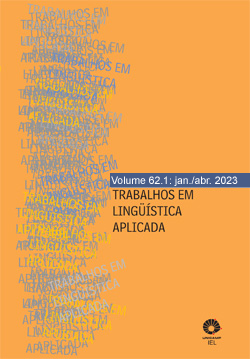Abstract
The aim of the present study is twofold: 1 to investigate the strategies used by a group of trainee teachers during the implementation via WhatsApp of pre-task activities inspired by the autobiographical approach; 2. to analyse whether and how learners show emotional engagement through online messages, referred here as the ability to express their own personal sphere in the host country’s language. The case study consists of the observation of 900 WhatsApp messages sent over a period of 39 days, aimed at carrying out 9 pre-task activities to enhance the intra-personal emotional sphere. The data were collected during an Italian L2 course designed for students of A2 level according to Common European Framework of Reference for languages (CEFR) with a multilingual and multicultural background and taught by trainee teachers.
The quantitative-qualitative survey, carried out on the basis of studies analysing digital communication and supported by the autobiographical approach, shows that pre-tasks offered the community of practice the opportunity to go beyond the teaching activity and to build an affiliate network with emotionally engaging communicative spaces, enriched by iconographic material and stylistically and linguistically refined life stories. From a professional perspective, the study shows the path taken by trainee teachers to acquire skills and competences – stylistic, pragmatic, linguistic, interactional and emotional – necessary to foster forms of affective and inclusive language learning through multimodal resources.
References
ANDUJAR, A. (2022). Analysing WhatsApp and Instagram as Blended Learning Tools. Research Anthology on Applying Social Networking Strategies to Classrooms and Libraries, p. 307-321.
BAZZANELLA, C. (1999). Forme di ripetizione e processi di comprensione nella conversazione. In: GALATOLO, R.; PALLOTTI, G. (Eds.), La conversazione. Un’introduzione allo studio dell’interazione verbale. Milano: Raffaello Cortina Editore, p. 205-225.
BOUHNIK, D.; DESHEN, M. (2014). WhatsApp Goes to School Mobile Instant Messaging Between Teachers and Students. Journal of Information Technology Education Research. v. 13, p. 217-231. Retrieved from http://www.jite.org/documents/Vol13/JITEv13ResearchP217-231Bouhnik0601.pdf. Access: 20 the December 2022.
BYRAM, M.; FLEMING M. (1998). Language learning in intercultural perspective: approaches through drama and ethnography. Cambridge: Cambridge University Press.
CALIANDRO, A.; GANDINI, A. (2019). I metodi digitali nella ricerca sociale. Roma: Carocci.
CASTRILLO, M. D.; MARTÍN-MONJE, E.; BÁRCENAS, E. (2014). Mobile-Based Chattinng for meaning negotiation in foreign language Learning. In: 10th International Conference of Mobile Learning: Proceeding, p. 49-58. Retrieved from https://files.eric.ed.gov/fulltext/ED557212.pdf. Access: 20 the December 2022.
COGNIGNI, E. (2016). Raccontarsi in italiano L2: percorsi autonarrativi nella formazione delle donne migranti. In: ANFOSSO, G.; POLIMENI, G.; SALVADORI, E. (Eds.), Parola di sé. Le autobiografie linguistiche tra teoria e didattica. Milano: FrancoAngeli, p. 116-138.
COMMON EUROPEAN FRAMEWORK OF REFERENCE FOR LANGUAGES: LEARNING, TEACHING, ASSESSMENT. COMPANION VOLUME WITH NEW DESCRIPTORS. (2018). Retrieved from https://rm.coe.int/common-european-framework-of-reference-for-languages-learning-teaching/16809ea0d4. Access: 20 the December 2022.
D’AGOSTINO, M. (2021). Noi che siamo passati dalla Libia. Giovani in viaggio fra alfabeti e multilinguismo. Bologna: Il Mulino.
DEMETRIO, D.; FAVARO, G. (2002). Didattica interculturale. Nuovi sguardi, competenze, percorsi. Milano: FrancoAngeli.
DEMETRIO, D. (2003). Ricordare a scuola. Fare memoria e didattica autobiografica. Roma: Laterza.
DEMETRIO, D. (1996). Raccontarsi. L’autobiografia come cura di sé. Milano: Raffaello Cortina Editore.
DIADORI, P. (2013). Gestualità e didattica della seconda lingua: questioni interculturali. In: BALDI, B.; BORELLO, E.; LUISE, M. C. (Eds.), Aspetti comunicativi e interculturali nell’insegnamento delle lingue. Cittadini europei dal nido all’università. Alessandria: Edizioni dell’Orso, p. 71-102.
DOMANESCHI, F.; DE VITA, L.; DI PAOLA, S. (2019). La pragmatica

This work is licensed under a Creative Commons Attribution 4.0 International License.
Copyright (c) 2023 Trabalhos em Linguística Aplicada


